 Petzlover
Petzlover Cheetoh is originated from United States but Ojos Azules is originated from Mexico. Both Cheetoh and Ojos Azules are having almost same weight. Both Cheetoh and Ojos Azules has almost same life span. Both Cheetoh and Ojos Azules has same litter size. Both Cheetoh and Ojos Azules requires Low Maintenance.
Cheetoh is originated from United States but Ojos Azules is originated from Mexico. Both Cheetoh and Ojos Azules are having almost same weight. Both Cheetoh and Ojos Azules has almost same life span. Both Cheetoh and Ojos Azules has same litter size. Both Cheetoh and Ojos Azules requires Low Maintenance.
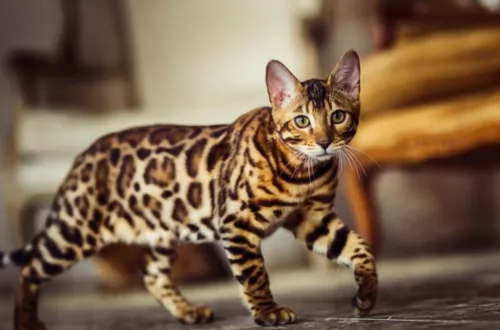 The Cheetoh is a beautiful cat whose parent breeds are the Ocicat and the Bengal.
The Cheetoh is a beautiful cat whose parent breeds are the Ocicat and the Bengal.
It was in 2001 that these two breeds were crossed by breeder Carol Drymon. Drymon was wanting to develop a new cat that would have characteristics similar to that of a wild cat but that would behave like a domesticated cat.
The Cheetoh became a recognized and registered breed with the United Feline Organization in November of 2004.
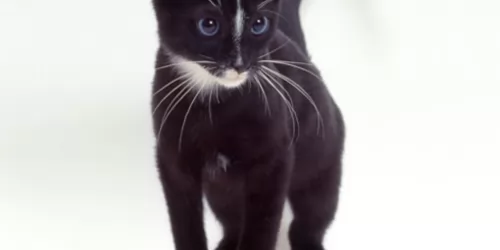 This is a fairly new cat breed that was discovered in New Mexico and its a rare cat. It was in 1984 that the cat was identified.
This is a fairly new cat breed that was discovered in New Mexico and its a rare cat. It was in 1984 that the cat was identified.
There was a feral colony of cats and one particular, a tortoise-shell female was selected to be mated with male cats of no particular description. Her kittens were born with deep-blue eyes, showing that the gene was dominant.
The unusual cat breed was named Ojos Azules which means ‘Blue Eyes’ in Spanish.
The Ojos Azules comes with both short and long hair. The cat was accepted for registration by TICA in 1991.
Only cats with the recognizable deep blue eye gene have been called Ojos Azules.
There was a time when it was discovered that cranial defects could be linked to the gene, and while breeding was temporarily suspended, it is back on track.
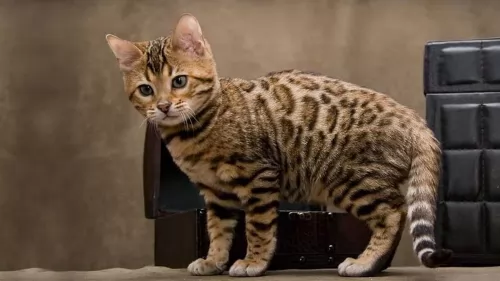 For a housecat, the Cheetoh is a muscular and large breed. In fact, this is one of the largest breeds of all the domesticated cats, with males being bigger than females. They can weigh anything between 7 and 10kg.
For a housecat, the Cheetoh is a muscular and large breed. In fact, this is one of the largest breeds of all the domesticated cats, with males being bigger than females. They can weigh anything between 7 and 10kg.
People want to own an animal that looks like a wild cat and the Cheetoh looks like a Cheetah. The coat of the cat can be several different colors and can be in different patterns with spots and stripes. He gets the spots from both the parent cats - the Ocicat and the Bengal. He definitely getd the longer legs from the Ocicat.
The purpose of the Cheetoh breeding program was to create an exotic, intelligent cat with a wild look and that would also be larger than your regular domestic cat. You could say it's the cats wonderfully soft, a velvety coat that makes it such an attractive cat.
Also, another notable feature with the cat is the way it walks - it looks as though it is stalking and prowling.
The cats are bred in 6 colors referred to as the black- or brown-spotted sienna, the black-spotted smoke the black- or brown-spotted gold, the black-spotted silver and the gold-spotted.
Your fascinating Cheetoh is a fun-loving cat, being playful and energetic and he will require a large yard and require being exercised.
They’re gentle cats but are talkative, being quietly friendly and social.
They make great family pets. They become devoted to their human family, being loyal and companionable. He is an affectionate, loving cat and his intelligence allows him to learn some simple commands and tricks.
He is the kind of cat that will do well in a family with kids and pets as he loves playfulness and fun, but he also wants to receive lots of love and attention.
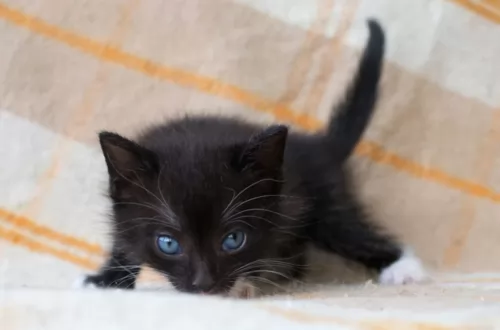 The beautiful Ojos Azules is a medium-sized cat and weighs in at between 3 and 5kg.
The beautiful Ojos Azules is a medium-sized cat and weighs in at between 3 and 5kg.
The cat’s most amazing round blue eyes are one of its most extraordinary features.
The gene in this cat isn’t linked to any particular fur color or pattern, so that means some of these cats will have a black coat but still have the blue eyes. The coat of the cat comes in many colors and is short and silky. Sometimes you’ll find some white markings on the paws and tail.
Not much is known of this cat breed because it is such a rare cat. Very few have owned this cat, but it seems as if, according to the people who have owned them, they are loving, friendly cats.
The small number that have been owned as domestic pets are said to have had balanced, loving temperaments, with the ability to show affection for their human owners.
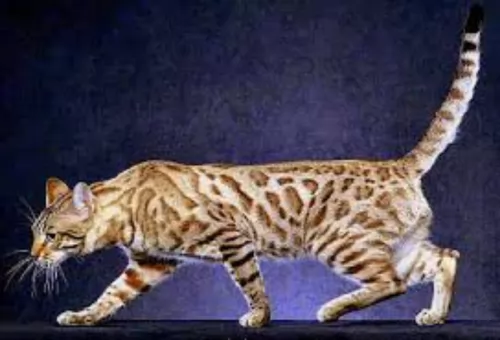 Cheetohs are a wonderful breed of cat and will love a busy household of adult humans, kids, and other pets.
Cheetohs are a wonderful breed of cat and will love a busy household of adult humans, kids, and other pets.
Remember that because of their wild side they have a high prey instinct and might like the idea of going after your small pets such as fish and birds.
Intelligent and playful you will need to keep your Cheetoh entertained and exercised with both mentally and physically stimulating puzzle-type games. One thing is for sure, with a Cheetoh in your home, you're never going to have a dull moment.
 The Ojos Azules cat, apart from its amazing eyes, is a regular cat that requires the same devotion from his human family that other cats enjoy.
The Ojos Azules cat, apart from its amazing eyes, is a regular cat that requires the same devotion from his human family that other cats enjoy.
Because this cat is so rare it is unlikely that you have one, but whatever furry feline friend you have, treat it with love and attention. The worst thing humans can do is to buy a pet, become bored with it, and then discard it.
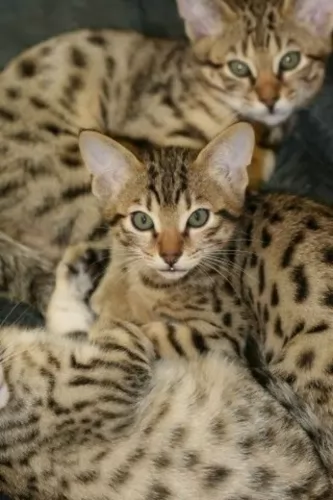 Whenever you buy a pet, particularly an exotic type of pet where you’ve spent a lot of money, make sure to check out potential health issues from the breeders.
Whenever you buy a pet, particularly an exotic type of pet where you’ve spent a lot of money, make sure to check out potential health issues from the breeders.
Always make sure to buy your cat from a reputable source to avoid health issues that could drastically shorten your Cheetoh cat’s life.
As with all cats, there are potential genetic problems in their ancestry that might reveal itself in your cat.
Certainly, if you suspect something is wrong, get your cat to the vet immediately.
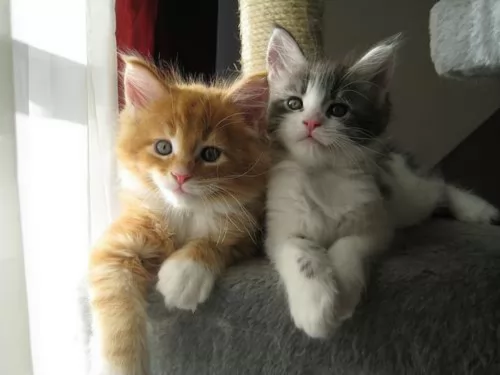 There don’t seem to be too many breed-specific health conditions associated with the Ojos Azules.
There don’t seem to be too many breed-specific health conditions associated with the Ojos Azules.
Having your cat spayed or neutered is beneficial to the cat long-term. Not only that, but it prevents unwanted pregnancies. Thousands of unwanted cats land up in animal shelters or are euthanized every year.
When you bring a new Ojos Azules kitten into the home, you will need to ensure the kitten is vaccinated, but also ensure he is tested for- and free of parasites.
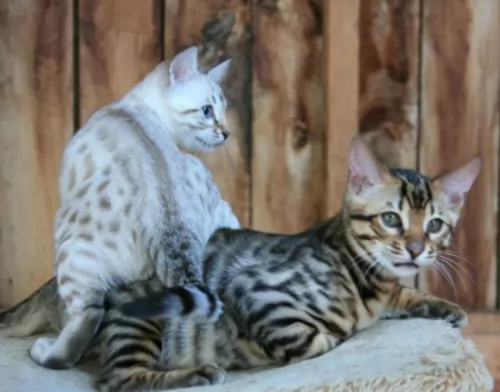 Although the Cheetoh is considered to be a hypoallergenic cat, no cat is really so, but nonetheless the coat is lovely and velvety and is shiny and short, being low shedding as well.
Although the Cheetoh is considered to be a hypoallergenic cat, no cat is really so, but nonetheless the coat is lovely and velvety and is shiny and short, being low shedding as well.
He will need lots of exercise, but luckily with his dog-like attributes, he can be taught to walk on a leash,
Ensure your cat has a nice dry, warm sleeping area.
These are energetic cats and he will need a complete commercially manufactured cat food that is high in protein, after all this is a carnivore and they require meaty diets.
If in any kind of doubt as to what to feed your Cheetoh, speak with your veterinarian if you have any concerns.
Make sure that your cat is never without a constant supply of fresh, cool water. A water fountain, with moving water, always encourages water drinking with cats.
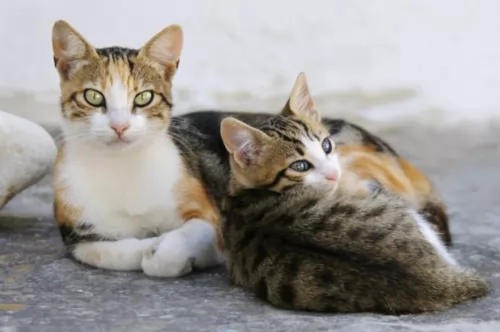 There are no particular requirements when caring for the Ojos Azules. Like other cat breeds, this cat also needs to be loved and well looked after.
There are no particular requirements when caring for the Ojos Azules. Like other cat breeds, this cat also needs to be loved and well looked after.
Contrary to what many people think, a cat isn’t a non-maintenance creature that can look after itself. There are many cat breeds that crave the companionship of their human owners and they need to be looked after carefully.
Ensure the best quality cat foods there are. There are many commercial cat foods and you want the high-quality ones with meat listed as the top ingredient.
A cat is a carnivore and meat is imperative for your cat to be healthy. If you feed your cat one of the commercially manufactured cat foods there are, you’ll find the food comes as dry, semi-moist, and canned.
The food you choose will come down to you and your cat’s preferences. If in any kind of doubt, speak to your local vet for recommendations. Remember, that an old cat, a pregnant cat or an ill cat will require a certain type of food.
You’ll need to coax your cat to use a litter box. The litter box should be in a quiet place where he can do his business in peace. Make sure you have the tools to scoop out your cat’s feces every single day. Cats like a clean litter box.
Provide the cat with a scratching post. If you have a cat as a pet, you must know it will scratch. You can’t change your cat’s behavior but you can do something about it to deter your cat scratching your furniture. You can buy him a scratching post so that he can scratch the way all cats do.